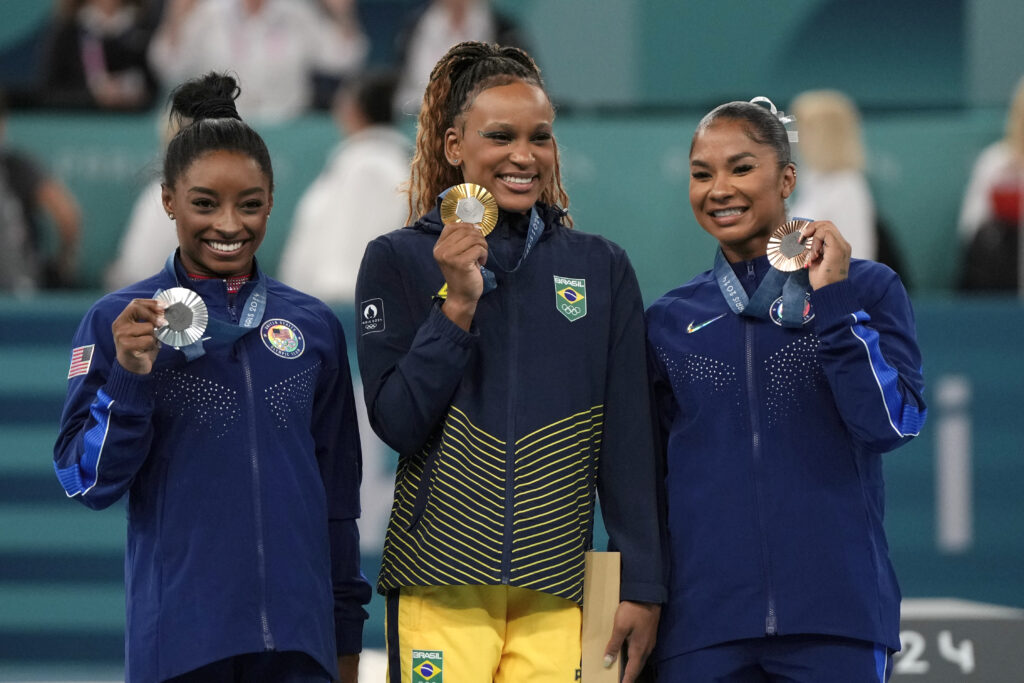Winter Olympics pale in comparison to diversity of Summer Olympics

Dr. Martin Luther King Jr. delivered a lecture entitled “The Other America” in March 1968, outlining our nation’s schizophrenic dualism. “There are two Americas,” he proclaimed.
U.S. sprinters Tommie Smith and John Carlos demonstrated as much six months later, each raising a gloved fist for Black power while “The Star-Spangled Banner” played at the Mexico City Olympics. The Summer Games have been our time to make a statement since 1904 when hurdler George Coleman Poage became the first African-American to win an Olympic medal. And ain’t nothing changed.
Sports contain metaphors for life and lessons on commitment, sacrifice, winning and handling defeat. They’re taught in a universal language that’s understood by every athlete around the world. But extraterrestrial visitors would have a skewed picture of the United States if their observations were based solely on Team USA.
If the aliens happened to catch Fox News first, they’d think DEI had run amok in Paris. But we know the truth.
Unlike the Whiter Winter Olympics, the Summer Olympics are warmer and more welcoming toward Black athletes, especially in track & field. Ever since Jesse Owens figuratively gave Adolf Hitler the finger by winning four gold medals at the 1936 Berlin Games, Team USA has gladly made room for our best runners and jumpers.
But we’re bringing flavor and special sauce to way more events nowadays. Gymnastics, obviously, but also swimming, fencing, judo, rugby and water polo. Images of Team USA at the Summer Games burst with diversity, capturing the nation’s multicolored, multicultural quilt far better than the Winter Games, held in the cold and snow.
It’s like noticing a glaring difference in pictures from the Democratic National Convention and the Republican National Convention. We’re all over the place in the former, but few and far between in the latter.
The Summer Olympics don’t discriminate. An entire continent and her diasporans are virtually non-existent in the other Games. Only six athletes from five countries represented Mother Africa at the 2022 Beijing Olympics. Black America didn’t produce a Winter Games medal winner until figure skater Debi Thomas (bronze) in 1988; at the 2006 Games, speedskater Shani Davis became the first African-American to win an individual gold medal.
I have no doubt that African-American and other Black athletes could excel at skiing, skating and other cold-weather sports. But barriers to access, including expense, don’t help that cause. I suspect cold weather is another turnoff. Beach vacations over ski trips are no-brainers in my book.
Winter is coming. Those words are ominous on “Game of Thrones,” conveying an astronomical fact and grave warning. While our challenging months ahead might not include White Walkers, shorter days and lower temperatures are guaranteed. We’ll long for the days of summer, which this year includes a glorious historic visual.
Donald Trump can ask when Rebeca Andrade of Brazil turned Black, but she’s 100% ours as much as Simone Biles and Jordan Chiles. When those gymnasts medaled in the women’s floor exercise, they formed the first all-Black podium in Olympic history. Biles (silver) and Chiles (bronze) went all out in congratulating their Brazilian sister, bowing in respect and admiration for her battling through poverty and three ACL knee injuries.
Biles told People they were “showing good sportsmanship and having fun out there because it was the last competition.” But having three Black women on the podium wasn’t lost on the greatest gymnast of all-time. “It was representation,” Biles said. “For all the little girls and boys that look like us, for them to believe in themselves that they can do it too.”
We see little girls and boys that look like us all over the world. They come together in the Summer Olympics to compete against one another and athletes who look nothing like us.
Nationalities differ and melanin varies, but racing doesn’t care about the races. Neither does hooping, swimming, fighting or any other event. U.S. sprinter Noah Lyles said, “Don’t get me wrong, I love the U.S., at times, but that ain’t the world,” sounding like many of us. We root for the red, white and blue but also have a soft spot for Team Black, athletes on our side of the international color line. Competitors on Team Jamaica are a given, but some members of Team France look like folks at my supermarket. You’d never know a brother or sister repped Team England unless they opened their mouth.
That’s part of the beauty of the Summer Games, the Olympics kaleidoscope.
It’s among the few instances when two Americas show up as one.
 Follow
Follow
